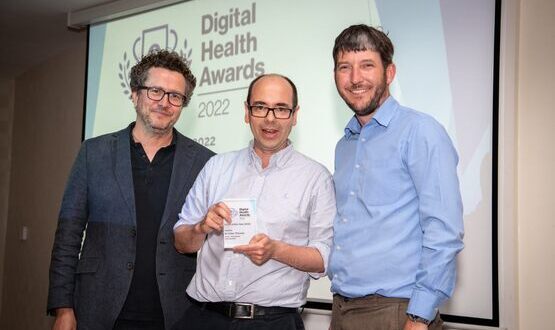In our second Digital Health Awards 2022 winner profile we hear from Peter Thomas, who was named CCIO of the Year. The CCIO and director of digital medicine at Moorfields Eye Hospital NHS Foundation Trust discusses his career journey to this point, how it felt to win the award, his future digital aspirations and advice for anyone aiming to become a CCIO.
What is your current role?
I am CCIO at Moorfields Eye Hospital and director of digital medicine there. My role is to support the development of a digital environment that actively benefits clinical services, as well as to champion a move towards digitally-delivered services. I’m also on secondment part-time to NHS Digital where I act as a clinical lead for digital on the national eyecare programme.
How did you become a CCIO?
I’d been interested in the application of technology to clinical practice for many years before I became a consultant paediatric ophthalmologist at Moorfields in 2017. Earlier in my career I had spent time working in the IT industry and had undertaken a PhD in computational neuroscience.
After I joined Moorfields, I was appointed to a new role working under the CCIO as clinical director of digital innovation where I focused on novel applications of technology to support clinical care. I took over as CCIO last year as a natural career progression from the innovation role.
To get myself ready to be a CCIO, I joined cohort two of the NHS Digital Academy, and took every opportunity to professionalise in clinical informatics, including fellowship of the Faculty of Clinical Informatics.
How did it feel to win CCIO of the Year?
Fantastic. We’ve taken a new approach to delivering clinical informatics at Moorfields, founding the UK’s first department of digital medicine. As with anything new, it’s great when the profession recognises that you’re going in the right direction. Although it’s my name on the award, I’m really only a representative of the brilliant team at Moorfields.
What is the most challenging part of your role?
It’s an interesting time in digital transformation of healthcare because there are so many different areas that you could choose to focus on. At Moorfields we have some of the most capable and innovative clinicians and researchers anywhere in the world and it would be easy to work on innovation projects full time.
However, I have to balance that against a very significant transformation programme to get our core infrastructure ready for a new hospital move in 2026. Getting the balance right is a challenge.
Within your organisation, what is the most significant digital achievement of the past 12 months?
From a clinical informatics perspective, it has been the creation of a department of digital medicine. As part of my Digital Academy research, I gathered feedback from 40 other digital leaders in the NHS to discover how they bring the clinical and technology aspects of digital transformation together.
The new department arose from that work and is supporting us to develop a team of digital clinicians who are professionalising as clinical informaticians and specialising in topics such as digital safety, exclusion, engagement, and innovation. This puts us in a much better place going forwards as we now have an engine to drive clinical informatics that is formalised, well embedded, and sufficiently resourced.
What is the largest barrier to achieving digital transformation?
Looking across the entire healthcare sector, I think it’s the scale and breadth of the change needed. We have hospitals and institutions that, in some cases, have centuries of tradition and process built around traditional models of medicine.
We’re now expecting those same organisations to deliver digital services that we would normally associate with digitally-native organisations that boast large IT departments and have their entire business model built around digital health. At the same time, those hospitals are also struggling with significant pressures and constraints. It’s a process that will take time.
What do you hope to digitally achieve within your role and organisation over the next 12 months?
We have significant improvements to our core systems in the pipeline, and we’ve built the foundations to begin moving exciting technologies like remote monitoring and clinical AI out of research and pilot programmes and into routine clinical care. In the next 12 months, I’d like to implement more of these future-looking technologies into routine care.
What advice would you give to anyone who is thinking of becoming a CCIO?
Take every opportunity to professionalise – there’s a huge chasm between the understanding I had as a clinician-enthusiast, and the understanding I’m developing now through things like the NHS Digital Academy.
Many will still be coming into clinical informatics without knowing that there is a network of professionals across the UK who can support you, and a whole host of conferences and professional development activities that you can use to build a network (such as the excellent Digital Health Summer Schools).
This is the second profile piece on the Digital Health Awards 2022 winners – our profile of the CNIO of the Year can be found here. You can find out who scooped each award here.

